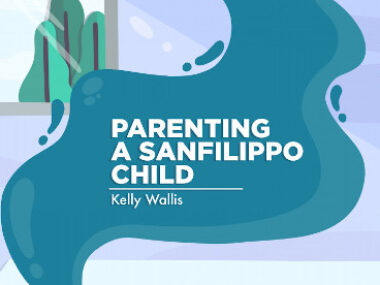Educating others about Sanfilippo syndrome, one bite at a time
To help others understand, we must share info in small, digestible pieces
Written by |

You know the saying about how to eat an elephant? One bite at a time. Whenever you are faced with something monumental, a task or challenge that feels too big to manage, you must break it down into smaller pieces. This has resonated with me recently.
My husband and I have two daughters, Abby and Emily. Abby is 30 years old and has a rare disease called Sanfilippo syndrome, and consequently requires full-time supervision and care. Our other daughter, Emily, is 27 and fully independent. She works as a teacher and lives on her own.
Emily recently had a stroke (yes, you read that right). She spent time in the hospital afterward, hoping that the doctors would figure out why. We’re still having some tests done, but so far, we don’t know what caused it. One of the scans revealed an enlarged spleen, and she has a mass on her thymus that shouldn’t be there. We’re still digesting all this information, one bite at a time.
When it happened, I alerted our friends and family on Facebook and asked for prayers for her healing. The response was overwhelming. Friends from my past called me, messaged me, and asked what they could do. It was amazing how much response and support we received based on that single post. We were so thankful.
Bite-sized pieces of information
Then I began thinking about how people respond to our updates about Abby, which are obviously much more frequent than those about Emily. It made me realize that we don’t receive nearly as many comments on posts about Abby.
At first, I was hurt. I didn’t understand why people were apparently ignoring Abby. But then it hit me: People simply don’t know what to say regarding her complex, rare disease.
I asked myself, “How do I respond when I come across a video about someone who has a rare disease or is medically complex?” I am sometimes overwhelmed with the information coming at me and my inability to process it all, and so I keep scrolling. Being confronted with a bunch of information we don’t know what to do with can be too much, especially when we don’t have the first clue how to help or respond. I think that’s what is happening with Abby. People care, but they don’t know what to say or do. They need information in small bites.
Seeing and doing are two different things
To a family whose child has a terminal disease, this can be misconstrued as apathy. It can be interpreted as “they don’t care about our child.” Honestly, I’ve had this thought many times since Abby was diagnosed eight years ago. The truth is, there’s really no way to comprehend the hardships of caring for someone like Abby until you actually do it. Reading or hearing stories about what is required is not the same. And I say this knowing I have no idea what other families go through daily to care for their children who have medical needs beyond what we face with Abby.
When my husband and I were in the hospital with Emily, I called my sister-in-law to ask her to watch Abby while we were gone. She and my nephew came over at a moment’s notice without hesitation. They later commented on how hard it was to maneuver Abby and how it took both of them to successfully get her into bed. But they remarked that it opened their eyes to what is involved in caring for Abby.
This revelation has stirred me up. The onus is on me and my husband to educate others about Sanfilippo syndrome in small, digestible pieces. To garner support, we must make it easier for people to understand the condition. We intend to keep this in mind going forward so that we can advocate for Abby in the most effective way possible — one bite at a time!
Note: Sanfilippo News is strictly a news and information website about the syndrome. It does not provide medical advice, diagnosis, or treatment. This content is not intended to be a substitute for professional medical advice, diagnosis, or treatment. Always seek the advice of your physician or other qualified health provider with any questions you may have regarding a medical condition. Never disregard professional medical advice or delay in seeking it because of something you have read on this website. The opinions expressed in this column are not those of Sanfilippo News or its parent company, Bionews, and are intended to spark discussion about issues pertaining to Sanfilippo syndrome.






Marilyn Turnbull
It is difficult to imagine the stressful load you carry each day. May God bless you with strength and His peace as you deal with the medical issues of both daughters. Praying for you and your family.
Sharon sharadin
I always read your articles and appreciate your honesty with the hardships you and your family face. It’s true, people don’t always know how to respond to others going through difficulties with special needs family members. Know that you are prayed for by those who don’t always respond.
Mary and John Porter
Kelly, You and Jeff are in our thoughts and prayers. We always enjoy your insightful articles We recognize the tremendous efforts required by your situation and praise you for your strength and dedication to your family. We send extra words of encouragement to you this day!